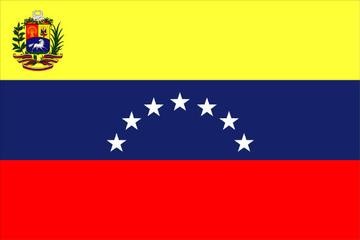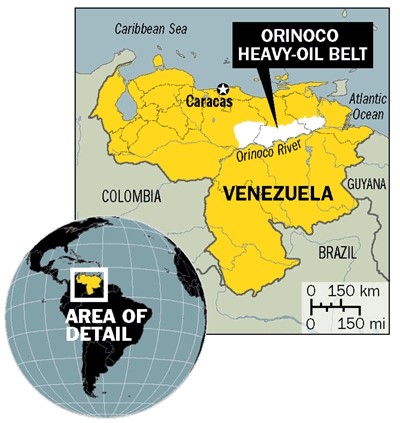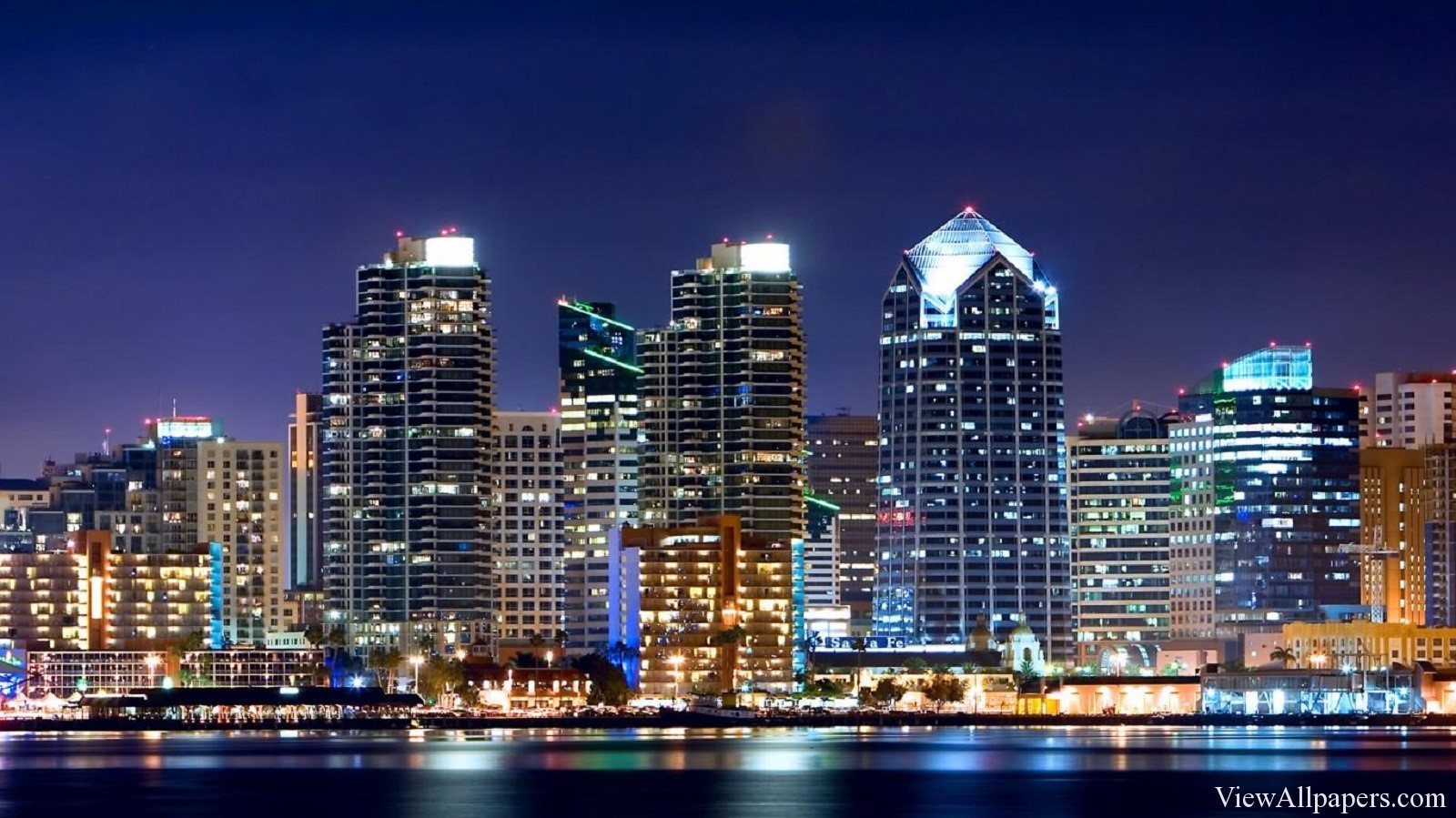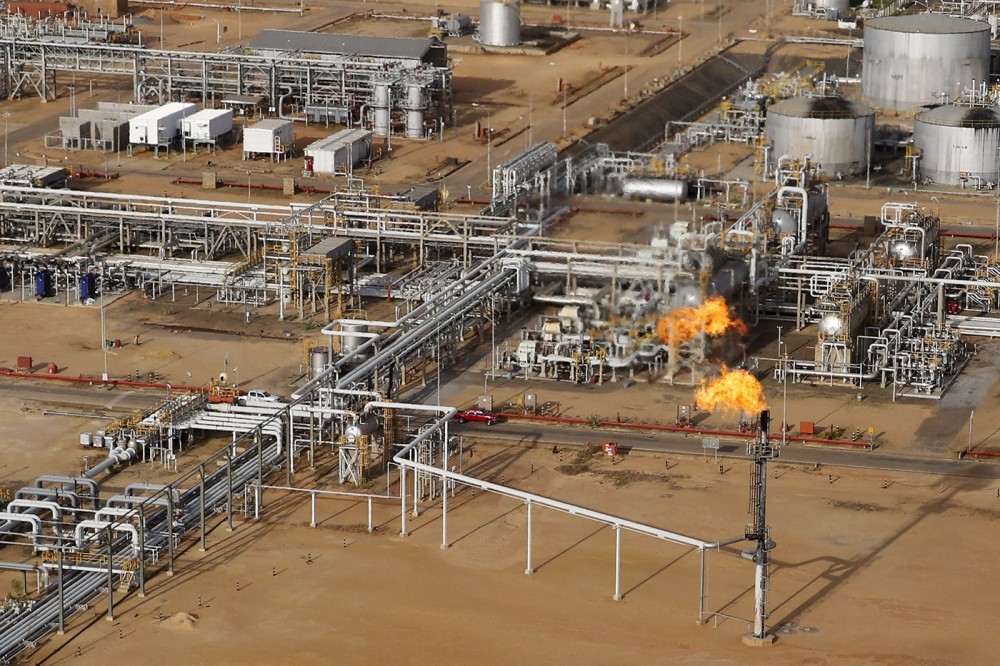Energy Security Intelligence Research
ESIR
ESG STRATEGY RISK and COMPLIANCE PLANNING AGENDA 2050
VENEZUELA

"Petroloes de Venezuela (PdV)-the National Oil Company strategy of importing light oil to use as diluent at its Orinoco heavy oil is facing new challenges of building new facilities that will cost billions of dollars that cash-strapped PdV doesn't have, and could take years to finish."


Venezuela has earned its reputation as a basket case resource curse economy. Inflation is likely to top 200% in 2016 and shelves are often empty of everyday items like milk and eggs. The value of the currency has been decimated. At the widely used black market exchange rate, someone earning the minimum wage would only bring in the equivalent of around $220 a year.
The oil price downturn has exacerbated the country's troubles and investors are betting on a debt default. It is against the odds, then, that there are, at long last, glimmers of hope in the country's long struggling oil industry. Politicisation and under-investment have hampered the state oil company, Petroleos de Venezuela (PdV). Production has been on the decline for a decade as PdV's new projects in the vast Orinoco heavy oil belt, the world's largest crude deposit, have been slow to get off the ground. But the new leadership at PdV has quietly made a series of pragmatic decisions that could start to turn things around for the oil industry. It is a pragmatism born of necessity, but it marks a break with the past. PdV, for instance, has publicly called on its foreign partners to help it with billions of dollars in financing for the new Orinoco projects.
Therefore, It has given those companies, such as Chevron, Repsol and PetroChina, more say over where the money goes and how the projects are developed. As a result, badly needed cash is starting to flow into the Orinoco belt, where wells are being drilled at a faster pace and new pipelines are being laid to carry growing crude volumes to market. At the same time, PdV is finally starting to show some flexibility in its development plan to help boost output. The company was pilloried in 2015 when it imported a cargo of Algeria light crude. Critics claimed that the fact it needed to import crude--despite its own vast oil reserves--signalled PdV's inexorable decline. But PdV and its partners need a steady flow of light hydrocarbons to increase production of its heavy oil in the Orinoco. And light oil is cheaper than the traditional naphtha.
PdV plans to step up these light oil imports to allow for more heavy oil production before costly new heavy-oil upgraders are built. The new strategy is popular with PdV's foreign partners, and the state company hopes it will allow it to increase outputs by as much 500,000 barrels-a-day over the next few years. There is, of course, much that could derail these plans. Billions of dollars of investment will need to be sustained by PdV and its foreign partners even as Venezuela goes through a difficult financial crisis. If the political winds in Caracas shift, it could lead to changes at the top of PdV or even see the return of nationalisation to the oil industry. Still, the changes under way mean that Venezuela deserves a closer look.

ONES TO WATCH
Americas: Tension in Venezuela scales-up
Sectors: all
Key Risks: political instability; social unrest; political violence
In Venezuela, political and social tensions are set to increase over the coming week with a potential for associated violent unrest across the country’s main urban centres. The opposition MUD coalition called on Venezuelans to peacefully take to the streets on 26 October 2016 to protest against the electoral authorities’ decision to suspend the process to launch a recall referendum against President Nicolas Maduro. On 23 October 2016 the opposition-led National Assembly declared Maduro had staged a coup d’état and broken constitutional law, and decided on plans to debate the constitutionality of Maduro’s presidency at an extraordinary session scheduled for 25 October 2016. The NA also urged the military not to respond to orders that would go against Venezuela’s Constitution. All rallies should be avoided due to the high risk of clashes between rival activists, and between the latter and the security forces.
PDVSA’s woes continue
Sectors: hydrocarbon
Key Risks: non-payment; foreign exchange shortage; political instability; civil unrest
US federal prosecutors are preparing to charge several individuals and confiscate their property over the alleged looting of Venezuelan state oil company PDVSA. Those investigated are alleged to have taken bribes from third parties to award inflated contracts through PDVSA, leading to US$11bln being siphoned out of the country. The investigation comes amid a worsening financial position for PDVSA, despite the company’s repayment of a US$1bln 2016 bond on 28 October. The repayment came only days after PDVSA announced the completion of a US$2.8bln bond swap that exchanged bonds maturing 2017 for new notes maturing in 2020. The swap prompted S&P to downgrade PDVSA to ‘selective default’. Together with low oil prices, dwindling foreign exchange reserves, a heavy debt repayment schedule, and mounting political instability amid attempts to secure a recall referendum on President Nicolas Maduro, there remains a high risk of default over the short to medium term.
Moreover, Police in Venezuela arrested more than 300 demonstrators following protests in several cities over President Nicolas Maduro’s decision to withdraw the 100 bolivar note from circulation. Maduro blamed the crisis on international sabotage after the planes carrying the new notes were delayed, but postponed the removal of the bills until 2 January 2017. Meanwhile, the Colombian and Brazilian borders were shut, and are expected to remain so as disruption and protests continue. The opposition has sought to renew anti-government protests at the end of the year, although they no longer have a constitutional method of ensuring new elections given that the government’s obstruction of a recall referendum against Maduro this year. The delay means that he would now be replaced by his vice president in the event of a successful recall vote, rather than new presidential elections being held.
US oil sanctions on Venezuela would escalate crisis
The Trump administration is ratcheting up its rhetoric against Venezuela in a bid to derail president Nicolas Maduro's efforts to rewrite the nation's constitution. The US has already imposed sanctions on high-ranking Venezuelan officials, including vice president Tareck El Aissami and a number of supreme court justices. But in recent days the US has floated the idea of targeting the Opec producer's oil exports if Maduro presses ahead with a July 30 constituent assembly election. Maduro aims to overhaul Venezuela's 1999 constitution, which would defang his opposition and solidify his hold on power.
Tough talk
Whether oil sanctions are a real policy option or simply tough talk to ramp up the pressure on Maduro is not clear, though the latter seems more likely. A senior US official said that while "all options are on the table", there are those in the administration that oppose the move. Imposing oil sanctions would raise the stakes for both sides, punishing Maduro's cash-strapped government and state oil company PdV, but also exposing US companies with ties to Venezuela and potentially US consumers.
Disrupting Venezuela's oil trade could prove a fatal blow to the country's crisis-wracked economy. Oil accounts for more than 95% of the country's foreign earnings, and the US is the country's largest and most important export market. In the first quarter of the year, Venezuela sent 0.724m barrels a day of crude to the US, accounting for roughly half of the country's oil exports. Crucially, sales to the US are vital to generating cash for Venezuela because much of the country's other exports go to China and elsewhere to repay loans or to Caribbean allies at a highly subsidised rate under the PetroCaribe programme.
Venezuela would seek to find new markets for its product. But given the large volumes involved and the uniquely heavy and sour makeup of Venezuelan crude it wouldn't be easy. The US Gulf Coast refiners have invested heavily to gear their facilities to be able to process heavy sour crudes like Venezuela's. China and India would be the most likely alternative markets for Venezuela. They have the heavy-oil processing capacity necessary, growing demand and an established trade relationship. Still, it's unlikely those nations alone could absorb all of the displaced imports.
Venezuela's perilous financial position would make even a temporary disruption in oil flows potentially ruinous. Venezuela's foreign reserves fell below $10bn this month for the first time in two decades, giving it virtually no cushion to deal with a cut in oil revenues. Imports have already been slashed to the point that food and medicine shortages are now commonplace, and broad economic sanctions would only worsen the nation's humanitarian crisis. The sanctions would also likely hasten a credit default, either at the government level or at PdV. The Venezuelan government and PdV face nearly $5bn in combined debt payments from August to the end of 2017 - nearly $3bn of which is owed by the state oil company.
Fallout
The fallout from such a scenario would be unpredictable and potentially dire. The ensuing economic chaos could force Maduro from power, but it isn't clear what would follow. A best-case scenario would see a broad multilateral diplomatic effort marshal a peaceful transition of power and an economic relief plan. However, the Maduro government has powerful allies in Russia and China, as well as some regional allies gained through its petrodiplomacy, that would likely oppose any effort to depose Maduro. The worst-case scenario would see a collapse of the state and a violent unruly transition spiral into civil conflict.
Avoiding such a worst-case scenario could sway the US away from harsh oil sanctions. So too would the potential pain at home. Venezuela has accounted for nearly 10% of total US crude imports in the first quarter of this year, and nearly 20% of imports into the Gulf Coast. Citgo, PdV's American subsidiary, Valero, Chevron and PBF Energy are the largest buyers of Venezuelan crude.
The market is well supplied and US stocks brimming, so consumers wouldn't likely see much of an impact from the absence of Venezuelan crude. But those refiners would have to scramble to find replacement heavy crude. Mexico and Colombia are other nearby heavy-oil producers, but both are seeing output fall and wouldn't be able to fill the gap. Canada's heavy oil output is growing, but pipeline capacity constraints would limit how much more crude could flow to the Gulf Coast. Saudi Arabian heavy crude grades could also substitute for Venezuela's, but it has said it is limiting exports to the US in an effort to draw down inventories there and boost the oil price.
Imposing harsh oil sanctions on Venezuela could also expose US companies in the country to retaliatory measures. Chevron, Schlumberger and Halliburton all have substantial economic interests in the country. Lashing out at the US companies would be self-defeating, but a nationalisation of their assets couldn't be ruled out. Venezuela could also stop importing US oil. Venezuela's uses light oil as diluent for its heavy oil output and has been an important outlet for US light oil exports, helping support tight oil growth, especially in the Permian.
Americas: Further US sanctions against Venezuela expected
Sectors: all
Key Risks: non-payment; FX shortage; civil unrest; deadly violence; political instability
In Venezuela, further US sanctions are expected following the controversial 30 July 2017 vote to elect a National Constituent Assembly (NCA) that will be tasked with rewriting the constitution, a move expected to further entrench President Nicolas Maduro’s power and officially upend what is left of Venezuela’s democracy. It remains unclear what the scope of the new sanctions would be, but reports suggest that they are not yet expected to include a ban on lighter US crude that Venezuela needs to dilute its extra-heavy crude to export. Additional sanctions could target regime-affiliated individuals, and financial restrictions could be placed on state oil company PDVSA. Broader sanctions could push Venezuela closer to default. The opposition has vowed to continue to take to the streets despite increasing deadly security-force repression. Further clashes should be expected across the country over the coming weeks.
Venezuela:
Implications of constituent law on individual tax wealth
What is the law about?
The Constitutional Law that creates the Tax on Wealth, which the National Constituent Assembly passed, was published on July 3, 2019, Official Gazette N° 41667.
The law outlines the following stipulations:
Taxable event
On August 16, 2019, the local tax administration effectively enacted a new law that permits taxing the net wealth of individuals qualified as “special taxpayers.’’ This qualification shall be given to the taxpayers through an official notification.
Who is obliged to pay this tax?
All individuals and entities qualified as special taxpayers who have a net worth of 150,000,000.00 tax units (around USD 350,000.00 or above) are liable to file and pay this new tax.
What qualifies someone as a “special taxpayer”?
Any individual or entity who received this year, or has ever received, a special taxpayer certificate issued by the local tax authorities will be automatically designated as a special taxpayer from the moment it receives the communication until the tax authorities decides to take away this qualification.
What is a “tax unit” defined as?
It is a measure that normalizes and keeps updated, year after year, the amounts specified in the Venezuelan tax laws and tax regulations, which are expressed in direct proportionality. The current value of a single tax unit is 50.00 VEN equivalent to 0.0025 USD.
Understanding the “special taxpayers’’ category
The Venezuelan Tax Administration uses the special taxpayers category to identify taxpayers (individuals and entities) whose net worth represents an amount equal or greater than the equivalent of 150,000,000.00 tax units (as mentioned before). This classification is one of the control mechanisms that tax authorities use to enhance the tax-collection process. In this sense, individuals and companies who are given this qualification will receive an official notification identifying them as a special taxpayer.
How is Venezuelan residence determined?
When is an individual presumed to be a Venezuelan resident?
In addition, the law presumes that an individual shall be considered a Venezuelan resident when accomplishing the following:
- A person’s household income is earned in Venezuela.
- A person’s spouse or children (dependent family members) have a permanent home or permanent establishment in Venezuela, or are Venezuelans.
- The individual has Venezuelan citizenship.
In order to demonstrate the nonresidence condition, the individual must present a certificate of tax residence, issued by a foreign tax authority, to the Venezuelan Tax Administration.
Territorial criteria
This new law will be applicable to both the Venezuelan residents and nonresidents as well. The tax base will be the value of the assets located both in Venezuela and foreign countries (if any) for residents, and only the assets located within the country for nonresidents.
Type of goods and rights subject to this tax
Goods and rights located in the country:
- The rights over immovable assets located in the country.
- Vessels, aircrafts, ships, and navigation belongings, and motor vehicles registered in Venezuela; in addition, the vehicles registered or enrolled in a different nation will be considered as goods located in Venezuela, provided that they have been in the other contracting estate for less than 120 continuous or discontinuous days.
- The capital shares and other security titles representing the capital of the company, issued by Venezuelan entities.
- Precious stones, jewelry, and works of art.
Taxable period
The declaration and payment of this tax must be made in the period between October 1 and November 30 of each year.
Who is exempted from this tax?
- The Republic and other political territorial entities;
- The Venezuela Central Bank;
- The functionally decentralized governmental entities;
- The main dwelling registered in the Tax Administration;
- Dwelling belongings;
- Social benefits and other benefits derived from labor relations;
- Communal property rights;and
- The assets invested in primary agricultural, livestock, aquaculture, and fishing activities, as long as they conform the taxpayer’s main business.
Some assets valuation methods
Immovable assets located in Venezuela: The value of immovable assets located in the country will be the highest amount resulting from the following methods:
- The value assigned by the municipal registry.
- Market value.
- The value resulting from updating the acquisition price.
- The value of lands will be included in the value of the properties built or under construction, except for buildings on lands of third parties.
- If the building is still under construction, the value will result from the price calculated over the percentage of the project.
- The improvement cost will be added to the immovable assets.
Immovable assets located abroad: To determine the value of immovable assets located outside the country, it is necessary to use the highest value resulting from the methods established in the contracting country or by using the current market value as of September 30 each year.
Other immovable assets: The value of immovable assets derived from multiple ownership contracts will be the highest value between the acquisition price and the market value as of September 30 each year.
Capital shares: The shares and other equity titles, including those denominated in foreign currency and/or listed in the stock exchange, will be valued according to their value as of September 30 each year.
Jewelry and art pieces: The value of jewelry, art pieces, and antiques will be determined using the higher value between the updated acquisition price or the current market value as of September 30.
Valuation rules: Goods and rights that are not included in this law will be valued at the higher value between the current market value or the updated acquisition price.